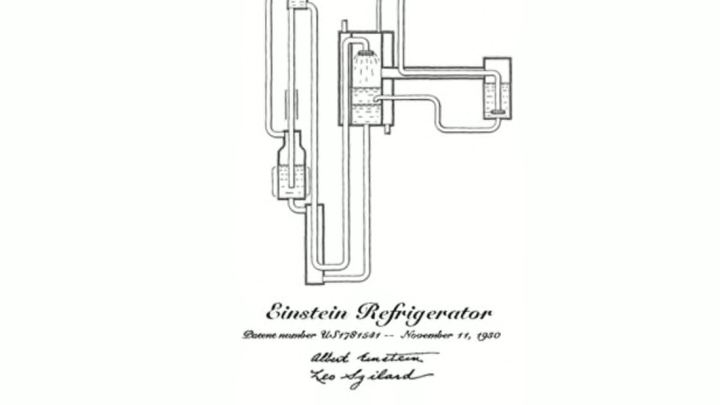After establishing the theory of relativity as a founding principle of modern physics, Albert Einstein turned his thoughts to higher matters: home appliances. In 1926, the Nobel Prize-winning scientist put his considerable mental energies towards developing the refrigerator to end all refrigerators—energy-efficient, environmentally friendly, and durable enough to last a century.
Einstein’s interest in consumer goods was initially piqued by a news story recounting the death of a family in Berlin from the poisonous fumes of their poorly sealed refrigerator—a danger which was growing increasingly prevalent as households exchanged their ice boxes for modern refrigerators containing volatile chemical coolants. He proposed a solution that avoided the use of deadly methyl chloride, ammonia, or sulfur dioxide, enlisting the aid and expertise of young Hungarian physicist, friend, and thermodynamics specialist Léo Szilàrd to draft a prototype of a safer, better “absorption refrigerator” instead.
In the traditional style of refrigerator, a mechanical compressor pressurizes potentially toxic gases to initiate the cooling process. So long as the fridge remains safely sealed, the risks to users are minimal, but a refrigerator’s moving parts often wear out its seal and expose its fatal contents to the air. Einstein and Szilàrd’s design would require no moving parts, instead using a heat source to naturally pressurize the gas contained within the series of circuits. With no immediate source of wear and tear, the Einstein-Szilàrd refrigerator would last as long as its external casing did—up to 100 years, experts estimate.
Over the course of their partnership, the two scientists took out 45 patents for refrigeration technology in six countries, eventually selling their key patents to appliance manufacturer AB Electro Lux. However, their design remained less efficient than compressor-type models, and the combined advent of the Great Depression’s effect on industrial budgets and the introduction of chlorofluorocarbons as less toxic chemical alternatives put an end to Einstein and Szilàrd’s domestic technology dreams—until a recent resurgence of interest by researchers at Oxford University, who have picked up on the idea of a fridge that can function without electricity or greenhouse gases as a green solution to our increased global dependence on cooling technologies. Though the remake of the original Einstein fridge has yet to make it to market, every kitchen might soon be keeping their drinks cold and their pie crusts chilled in Einstein’s new and improved brainchild.
